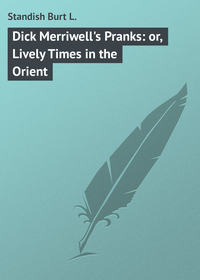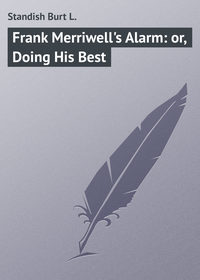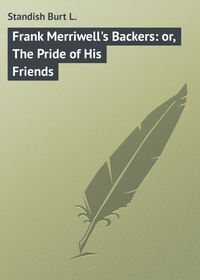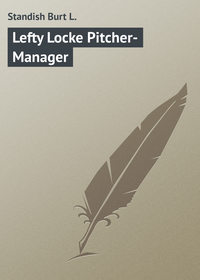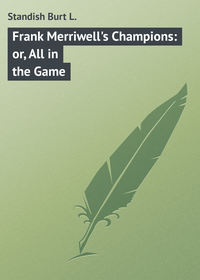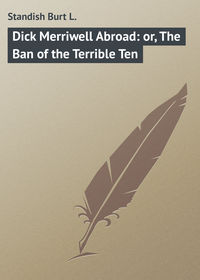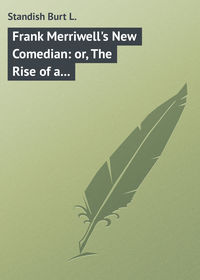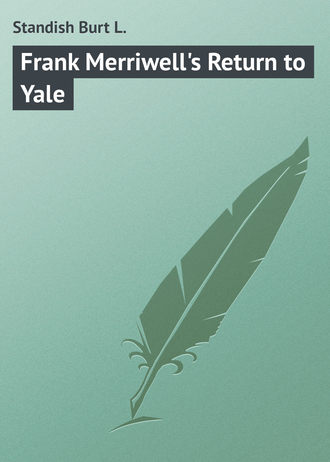 полная версия
полная версияFrank Merriwell's Return to Yale
"Excuse me," mumbled "Old Put." "I don't care for anything more."
"But you will have one drink with me?" urged Frank.
"No," said Putnam, shortly, "I've had enough."
Then he sauntered toward the door.
Merriwell bit his lips and turned on Stubbs.
"You'll have something, Bink?" he said, huskily.
"No, thanks," said the little fellow. "I'm going, too."
He followed Putnam.
Creighton was Merriwell's last resort. As old readers know, he had been a guest at Charlie's home in Philadelphia.
"Come, Creighton, you surely will not decline to take something with me, old fellow?"
Charlie hesitated, flushed to the roots of his hair, looked at Frank and at the others, then got up quickly, saying:
"You'll have to excuse me, too, Merriwell."
With that he bolted out of the room, and all the others followed, leaving Frank there alone.
For some moments the stunned and astonished lad stood as if turned to stone, staring with distended eyes toward the door by which they had passed out. His hands were clinched, his nostrils dilated, his head thrown back and his attitude that of a warrior wounded to the heart, but still unconquered in spirit.
He was aroused by a touch on the arm, and the smooth, almost sneering voice of a waiter asked:
"What will you drink, sir?"
Frank lifted one hand to his head and seemed to awaken from a dream. He looked at the waiter doubtfully, as if he did not understand the question that was put to him, then, after a bit, said:
"Thank you, I never drink."
The corners of the waiter's mouth curled upward in the faintest smile – a smile in which pity and scorn seemed to mingle. That aroused all the fury in Frank Merriwell's heart, and, with his eyes blazing, he half-lifted his fist as if he would strike the man in the face. Then he as quickly dropped his hand at his side, shivering as if he had been touched by a sudden chill.
The waiter had shrunk away with Merriwell's menacing movement, but when he saw there was no danger, he softly said:
"I beg your pardon – I thought you were going to drink, as you asked the others to have something with you."
How the words cut and stung! It was as if the man had struck him across the face with a whip. He fell back, half-lifting his hand, and his chin quivered.
"I did ask them!" he hoarsely whispered – "and they refused! Not one of them but would have considered it a high honor to have me ask them a month ago! And I have come to this!"
His words were incoherent, but his face told the story of his wounded pride. He remembered how many times he had been welcomed with a shout in that little room where the famous tables hung upon the wall. He remembered how his admirers had gathered about him, eager to listen to every word he might speak, and roar with laughter at his stories and jests. He remembered the songs, the speeches, all the jolly times in that room.
Little had he dreamed the time would come when the very ones he had counted as his warm friends would refuse to drink with him there and turn their backs on him in disdain.
Nothing could have hurt him more than that. His pride was cut to the core, and his spirit was shaken as it had never been before.
His first thought was that he would find a way to get even with them all. Then he realized how great a task that would be. He saw himself scorned and ostracized by the whole college, and, for a fleeting moment, he thought of leaving New Haven forever that very night.
His brain began to whirl. The waiter was standing there, looking at him in a manner that seemed rather insolent.
"What do you want?" he snapped.
"I beg your pardon," returned the waiter; "what do you want?"
"Whiskey!" cried Frank Merriwell – "bring me whiskey, waiter, and bring it quick!"
CHAPTER XXXIII
"FOR THE HONOR OF OLD YALE."
The order was filled, the whiskey was brought. It was placed on the table at which Frank sat. He stared at it in surprise.
"What's that?" he asked.
"Why, sir, it's the whiskey you ordered," answered the waiter.
"Whiskey?" said Merriwell, in a dazed way. "Did I order that?"
"Yes, sir."
He paid for it.
Later, when a gay party dropped in, he was sitting at that table, with the untasted whiskey before him. He sat there staring and scowling at the table, but paid no attention to any one. The expression on his face made him look like anything but his old jolly self.
No one spoke to him. Newcomers drank, joked, laughed and went out. Still he sat there, scowling and staring at the table.
The report spread that Merriwell had been cut by his old friends. Curious ones strolled in and ordered a drink just to get a look at him. He seemed quite unaware of this.
Never in his life had Frank tasted whiskey, but for one moment he had weakened and thought of easing the blow to his pride by resorting to the stuff.
Merriwell was human, but still that weakness lasted no more than a moment. Then he came to himself, and he was ashamed to think that he had contemplated such a course. It seemed cowardly.
"They say I am a coward," he thought; "but I am not a coward enough for that."
For more than an hour he sat there at the table. Finally he seemed to come out of the stupor that had seized upon him.
"Waiter," he called.
His voice was calm and natural, the scowl had vanished from his face, and he was himself once more.
"Waiter, you may remove this whiskey and bring me a lemon-seltzer. I don't care for this stuff."
When this order was filled, he calmly drank the lemon-seltzer, paid for it, rose to his feet, pulled on his gloves, and left Morey's with an air of combined nonchalance and dignity.
He was his own master once more. He had been insulted by fellows he formerly believed friends, but he was still Frank Merriwell. He felt within himself that he was a man and the equal of the best of them. Some day they should be ashamed when they remembered their act. He felt confident that day would come.
That night he slept as peacefully as a child, and arose in the morning refreshed and undisturbed. He would not permit his mind to dwell on what had happened, but resolutely set himself at his studies.
Those who had thought Merriwell, having once been so popular, would be crushed, soon found out their mistake. He was calm, quiet, and dignified. He did not seek the society of his fellows, but seemed the same old Merriwell to those who came to him. He was perfect in his recitations. He attended the gym., as usual, taking his daily exercise. He paid not the least attention to sneering words and scornful looks.
Frank's bitterest enemies were dissatisfied. They had fancied he would be utterly broken by his downfall, and they could not understand his dignity and disregard for public opinion.
Those who had reluctantly turned against him were impressed by his strength of spirit and dignity. He carried about him an air of manliness that won their admiration, despite themselves.
But every one had not turned against him. Bruce Browning was stanch and true, although he fiercely berated Merriwell for his course.
Harry Rattleton tried to remain unchanged, and never a word of reproach did he utter, no matter what he thought.
Jack Diamond did not say anything, but it was because he could not trust himself to speak. In his heart he felt like punching Frank and whipping his enemies and traducers; but he knew enough to let Merry alone.
Halliday held aloof. He was thoroughly disgusted with Merriwell. At first he said as much, and then he became silent and would say nothing at all.
So the days went by. Frank called on Inza, but did not mention what had happened. He had thought of telling her everything, and then he decided that it would do no good, and he would tell her nothing. It was too late for him to change his course, and it could do no good to talk it over. He preferred not to think about it.
The football team continued to practice and get ready for the great game at Cambridge. It was said that Harvard had the strongest eleven put on the field by her in five years. Her games with the higher teams had shown she was "out for blood." There was doubt and uncertainty in the Yale camp.
Ott, Marline's substitute, was not satisfactory. Those who understood the situation best said that an injury to Marline early in the game would ruin Yale's prospects.
The anxiety increased as the day of the game approached. Some claimed the eleven had not been properly trained, others asserted they had been overtrained.
From Frank Merriwell's manner one could not have suspected he had ever taken the slightest interest in football. He did not seem to know anything of the general gossip.
It was the night before the game. Merry had been studying. He was alone in his room. At last, feeling exhausted, he flung open the window and looked out.
It was a perfect night, cold, clear and light. The sky was filled with stars. From across the campus came the sound of a rollicking song.
Directly beneath Frank's window was a group of students who were excitedly discussing something. Their words attracted Merriwell's attention.
"It's settled," said the voice of Paul Pierson. "Yale will not be in the game for a minute. What can a team do without a first-class full-back?"
"Isn't there a chance that Marline's ankle will be all right in time for the game?" asked another of the group.
"Not a chance," positively asserted Pierson. "The doctor says he'll not step on it for three days, at least. It is a bad sprain."
"Such beastly luck!" growled Randy Robinson. "Now if Merriwell – "
"Don't speak of that fellow," exclaimed two or three.
"He is the only hope for Yale," declared Pierson. "Ott isn't in it for a minute. Frank Merriwell must be appealed to for the honor of old Yale."
"Who'll appeal to him?"
"I will, if they'll give me authority. I know he will play when he understands the situation."
Merriwell drew in his head and closed the window. His face was pale. Up and down the floor he walked.
"For the honor of old Yale!" he muttered.
Then he suddenly cried:
"For the honor of old Yale I will do anything!"
Then came a knock on his door.
CHAPTER XXXIV
A SENSATION ON THE FIELD
The day of the great football game between Harvard and Yale had arrived. The hour approached.
Jarvis Field was ready for the great struggle. The white marks of the gridiron were regularly and beautifully made.
The sun shone down from a clear sky. There was no breeze, but the air was crisp, for all of the sunshine.
At either side the stands were filled; hundreds upon hundreds were standing; hundreds upon hundreds were coming. A better day for the game could not have been ordered, and spectators were turning out in force.
Harvard students were there in a body. They flaunted the crimson and sung their songs of glee. Their faces were radiant, and they were confident of victory.
Yale had sent her representatives by hundreds. They wore the blue, they waved the blue, they cheered for the blue.
Everywhere the blue and the crimson could be seen. Everybody was partisan; everybody had a favorite.
Back of the dark mass of human beings, beyond the limit of the field, were the trees and the great buildings with their many windows, upon which the sunshine glinted coldly.
Policemen kept back the standing mass of spectators, or those in the rear would have pressed those in advance forward upon the field.
A few of those in the rear had obtained boxes or stools, upon which they were standing in order to look over the heads of those before them. A wagon was covered with spectators; they were standing on the spokes of the wheels.
The excitement and the eager anticipation was most intense. It betrayed itself on every face.
Not far from the point where the mass of Yale blue was thickest two lads were talking. One wore the blue, the other wore the crimson. The first was Sport Harris, and the other was Rolf Harlow, who had been forced to leave Harvard after being exposed as a crooked gambler.
"Every dollar is up," said Harlow, gleefully. "We are in to win a good pile on this game if what you say is right."
"What I have told you is straight."
"Marline can't play?"
"No."
"Ott is a poor man?"
"Sure."
"And there is no chance that Frank Merriwell will be run in?"
"Bah!" exclaimed Harris, disdainfully. "Merriwell is a dead duck at Yale. He'll never count in anything more. He is an outcast now. What do you think? – he's universally rated as a coward."
"Oh, say!" exclaimed Harlow; "that's too much! You don't expect me to believe that about Frank Merriwell?"
"Believe it or not, it's true."
"I don't understand how it could come about, for you and I know there is not a drop of cowardly blood in Merriwell. Confound him! If there had been, some things that have happened would not have taken place."
"Circumstances have conspired to put him where he is, and he'll never dig out. He has a few enemies who will take care to keep him down, now he is down."
"Well, I'm glad he's not on the team. We'll make a fat thing out of this, old man."
"Yes, I gave you every dollar I could raise, so you must know I am dead sure Harvard will win. If, by any fluke, Yale should happen to pull off this game I shall be busted."
"Same here."
"In that case, we'd have to stand in together and catch some suckers. We've done it before."
"And been exposed in it by that cursed Merriwell! Oh, I'd like to get a good rap at that fellow! He has spoiled a number of good, soft things for me since we first met."
"You can't hate him more than I do."
"I don't know about that; but he has been a lucky devil. I'm glad he's not going to play for Yale to-day."
"He couldn't win the game alone."
"No, but it would be Yale's luck to win if Merriwell played. He has been a mascot for Yale in almost everything."
Harris believed this, for he remembered how many times Frank Merriwell had been the instrument by which Yale had snatched victory from apparent, certain defeat.
Suddenly a band struck up, and out upon the field came the Harvard eleven on the trot. What a cheer went up – what a wild roar of greeting!
For the moment it seemed that the crimson was everywhere. The band hammered away, and the blood was leaping in the veins of the thousands of spectators.
Harvard immediately took a bit of preliminary practice.
"They are the boys to polish Yale off this year!" laughed Harlow. "It's going to be a snap for Harvard."
"I believe it," grinned Harris. "We'll have money to burn after this game."
Suddenly another kind of a cheer rent the air, and now the blue was waving everywhere. Onto the field came the Yale eleven at a sharp trot.
Harris and Harlowe laughed and nudged each other with their elbows.
"See the little lambs!" chuckled the sport.
"Coming to the slaughter!" grinned Rolf.
"Too bad!"
"It's a shame!"
"I feel for them."
"I expect to feel for that money. Where's Ott?"
"Why, he's right over – over there – where the dickens is Ott?"
"Can't you see him?"
"Can't seem to, but he must be there. Yes, there he is with the group out to the right."
"Those are the substitutes. Why is he with them?"
Harris stared, quite as much puzzled as Harlow, for he had understood that Ott was to be put in as full-back for Yale at the very start.
"It must be – it can't be – it can't be Marline is going to try it!"
"You said he couldn't step on his foot."
"He can't."
"Then he isn't in it."
"Of course not."
"Who is?"
"You tell!"
Then, all at once, Harlowe caught Harris by the shoulder, and, pointing toward the field, almost screamed in his ear:
"Ten thousand furies! Look there – look there, you blunderer! See him – see that tall, straight fellow?"
"Where? – who?"
"Where? Who? Right there, with the Yale captain – with Forrest! By all the living fiends, it is – "
"Frank Merriwell!" gasped Harris.
"Yes, and he is going to play full-back for Yale! He'll hoodoo Harvard! Yale will win this game!"
CHAPTER XXXV
STOPPING A TOUCHDOWN
Frank Merriwell was there. His appearance was a surprise to nearly all the Yale crowd; it created a sensation.
"Merriwell has been taken in to fill Marline's place!" was the excited statement that went around.
"It's a foolish move," declared scores. "He has not been practicing with the team. He's not in condition."
They did not know Frank Merriwell thoroughly, for he kept himself in condition constantly.
At first his appearance seemed to create doubt and uncertainty among the spectators who were interested in Yale. Gradually, however, enthusiasm grew. It was remembered how he had carried the ball right through Princeton's center in the game the year before, making the most remarkable run ever known on a football field. Yale had felt her chance was a desperate one; surely it could not be any worse. Perhaps it might be bettered by the placing of Merriwell at full-back. It was a desperate resort, but who could say the result would not justify the move?
Forrest was talking to Merriwell, having drawn Frank aside. They were in earnest conversation.
A little negro boy came on the field. How he escaped the vigilance of the officers was a mystery, but he reached the group of substitutes.
"Heah!" he called, flourishing something in his hand: "heah am suffin' to Mistah Merriwell. Where am he?"
It was a folded scrap of paper. One of the substitutes took it and told the boy to "chase himself."
"I's done got mah pay fo' bringin' it," he chuckled, as he scudded off.
The note reached Merriwell when he had finished talking with Forrest. He took it in surprise, and then opened it hastily. A gasp came from his lips when he saw the writing.
"From Inza!" he whispered.
This is what he read:
"Dear Frank: Did not receive your letter till this morning. Too late then to answer. Had left New Haven for Boston before I read it. You asked me to release you from your promise not to play football. No, I will not! You must not play! If you do, I'll never speak to you again! I know Yale will win if you play! You must not play! Hastily,
"Inza."
"Line up!"
The game was about to begin!
Frank tore the note into many pieces, and those pieces he tossed aside. His face was stern and determined.
"It's for old Yale – dear old Yale!" he muttered. "She has no right to ask so much of me without giving me a reason for it. I must play – I will play!"
Out to positions went the two teams. They lined up for business, and a great hush came over the mighty jam of spectators.
Yale had the first kick-off, and Merriwell balanced himself for it.
Pung! – away sailed the ball clean through Harvard's goal posts, causing the uninitiated to tremble, as it was an exquisite exhibition of kicking.
But this kick really gave Yale no advantage, for the rule gives the ball to the opponents on such a play.
Harvard's full-back sent it spinning back into the center of the field. It looked like another kick by Merriwell, but, instead of that, Yale tried Mills, the right-half, who could make only two yards against Harvard's heavy forwards.
The game was on in all its fury, and the excitement was intense. Kick followed kick in quick succession, but that style of play did not seem to gain anything worth gaining for either side.
Yale got the ball and tried the revolving wedge on Harvard. They could not make a big gain, for the Cambridge lads were like a stone wall.
Again and again was this style of play tried, till Harvard got the ball on downs.
Then came Harvard's turn to see what she could do, and the first attempt was a try at the tandem play, made famous by Pennsylvania.
Yale seemed ready enough for that, and the way she cut through and broke Harvard's line showed immediately that the tandem was not likely to prove very effective.
Then Harvard called on Benjamin, her right-half, and a moment later the rush line did a fine piece of work, opening Yale's center and letting the little fellow through.
Benjamin had the speed of the wind. He also had the ball. Away he went with it, and there was a clear field before him.
Harvard admirers roared from all over the field. The crimson flaunted everywhere.
It looked like a sure touchdown for Harvard. Every Yale spectator held his breath in racking suspense.
Benjamin was flying over the ground. It seemed that his feet scarcely touched the turf.
Where is Yale now? What chance has she to stop the little fellow with wings on his feet?
Three seconds of suspense seemed like three hours of torture. It was awful!
A Yale man was after little Benjamin – was gaining! Could he stop the little fellow in time? It must be a tackle from behind, if at all, and the slightest slip would bring failure.
Behind them came all the others on the run, strung out raggedly.
Benjamin would make it – he was sure to make it. His pursuer could not reach him in time.
Then it seemed that the Yale man had springs in his legs, for he sailed over the ground like a frightened rabbit. He closed in on Benjamin and flung himself headlong at the little fellow.
Down slipped the tackler's hands, down from the hips to the knees, to the ankles. Down went Benjamin with a hard thump, stopped within three yards of Yale's line.
Twenty men piled upon tackler and tackled.
Deep down beneath that mass was Frank Merriwell, his hands clinging like hooks to Benjamin's ankles.
He had stopped what seemed to be a sure touchdown for Harvard at that early stage of the game.
CHAPTER XXXVI
WON BACK
Beside Inza Burrage, in a splendid position to watch the game, sat a pretty girl with fluffy hair. She wore Harvard's colors, and seemed greatly excited.
"There he is!" she exclaimed, at various stages of the game – "there is Jack! See him, Inza!"
"Yes," said Inza, "I see him."
But her eyes were not on the one meant by her companion. She was watching Frank Merriwell, and she bit her lip as she watched.
She had seen him receive her note, she had seen him read it, tear it in pieces, cast the pieces aside.
"He will play!" she muttered. "He will break his promise to me!"
Her companion heard her words.
"You said Merriwell would not go into the game," she cried.
"Yes, I said so, but I was wrong. He gave me his promise not to play, and last night he sent me a letter asking to be released from that pledge. The note I sent to him a short time ago was a reminder of his promise, and a refusal to release him."
"Yet he will play?"
"He is going into the game."
"Then it can't be that he thinks as much of you as you supposed."
"He does not. This has settled that point."
"I'm afraid Harvard will not win, Inza. Jack says Frank Merriwell has been Harvard's hoodoo in everything. He was sure Harvard would obtain this game if Merriwell did not play. You said he did not mean to play, but I wanted you to ask him not to do so."
"I did ask him, something I should not have done had we not been such friends, Paula, although I was curious to know how much influence I had over him. Oh, I think he is the meanest fellow! I shall hate him now!"
Inza's eyes were flashing and her face flushed. She was intensely angry, and she showed it.
Paula Benjamin was startled.
"Oh, you musn't be too hard on him!" she said. "You know how much Jack loves Harvard, and how crazy he is for Harvard to beat Yale in this game. I was almost as crazy myself, and that is why I wanted you to ask Mr. Merriwell not to play."
"I shall never trust him again," whispered Inza, hoarsely – "never! He has broken his promise to me."
"It is certain he loves Yale as dearly as Jack loves Harvard. He may think it is his duty to break his word for the sake of Yale."
"I don't care! I don't care! I do hope Harvard will beat!"
With breathless interest the two girls watched the game. They were nerved to a point of intense excitement. They saw Harvard stand like a stone wall against Yale's repeated assaults. It was a battle of gladiators.
Then came Harvard's tiger-like assault upon Yale's center, and Jack Benjamin went through with the ball. The great crowd of spectators rose as one person, seething with excitement, as Benjamin flew toward Yale's line.


